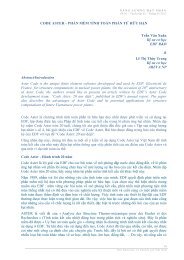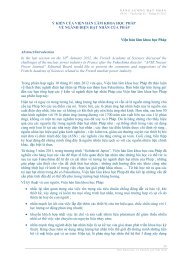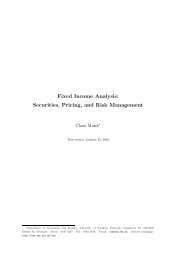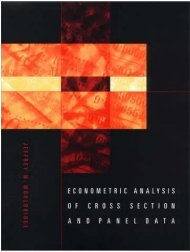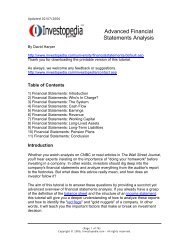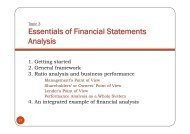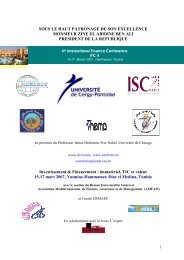- Page 2:
To Shirley, Laurie, and Leslii
- Page 8 and 9:
CONTENTSvii11 Balance of Payments C
- Page 10 and 11:
2 CHAPTER 1. SOME INSTITUTIONAL BAC
- Page 12 and 13:
4 CHAPTER 1. SOME INSTITUTIONAL BAC
- Page 14 and 15:
6 CHAPTER 1. SOME INSTITUTIONAL BAC
- Page 16 and 17:
8 CHAPTER 1. SOME INSTITUTIONAL BAC
- Page 18 and 19:
10 CHAPTER 1. SOME INSTITUTIONAL BA
- Page 20 and 21:
12 CHAPTER 1. SOME INSTITUTIONAL BA
- Page 22 and 23:
14 CHAPTER 1. SOME INSTITUTIONAL BA
- Page 24 and 25:
16 CHAPTER 1. SOME INSTITUTIONAL BA
- Page 26 and 27:
18 CHAPTER 1. SOME INSTITUTIONAL BA
- Page 28 and 29:
20 CHAPTER 1. SOME INSTITUTIONAL BA
- Page 30 and 31:
22 CHAPTER 1. SOME INSTITUTIONAL BA
- Page 32 and 33:
24 CHAPTER 2. SOME USEFUL TIME-SERI
- Page 34 and 35:
26 CHAPTER 2. SOME USEFUL TIME-SERI
- Page 36 and 37:
28 CHAPTER 2. SOME USEFUL TIME-SERI
- Page 38 and 39:
30 CHAPTER 2. SOME USEFUL TIME-SERI
- Page 40 and 41:
32 CHAPTER 2. SOME USEFUL TIME-SERI
- Page 42 and 43:
34 CHAPTER 2. SOME USEFUL TIME-SERI
- Page 44 and 45:
36 CHAPTER 2. SOME USEFUL TIME-SERI
- Page 46 and 47:
38 CHAPTER 2. SOME USEFUL TIME-SERI
- Page 48 and 49:
40 CHAPTER 2. SOME USEFUL TIME-SERI
- Page 50 and 51:
42 CHAPTER 2. SOME USEFUL TIME-SERI
- Page 52 and 53:
44 CHAPTER 2. SOME USEFUL TIME-SERI
- Page 54 and 55:
46 CHAPTER 2. SOME USEFUL TIME-SERI
- Page 56 and 57:
48 CHAPTER 2. SOME USEFUL TIME-SERI
- Page 58 and 59:
50 CHAPTER 2. SOME USEFUL TIME-SERI
- Page 60 and 61:
52 CHAPTER 2. SOME USEFUL TIME-SERI
- Page 62 and 63:
54 CHAPTER 2. SOME USEFUL TIME-SERI
- Page 64 and 65:
56 CHAPTER 2. SOME USEFUL TIME-SERI
- Page 66 and 67:
58 CHAPTER 2. SOME USEFUL TIME-SERI
- Page 68 and 69:
60 CHAPTER 2. SOME USEFUL TIME-SERI
- Page 70 and 71:
62 CHAPTER 2. SOME USEFUL TIME-SERI
- Page 72 and 73:
64 CHAPTER 2. SOME USEFUL TIME-SERI
- Page 74 and 75:
66 CHAPTER 2. SOME USEFUL TIME-SERI
- Page 76 and 77:
68 CHAPTER 2. SOME USEFUL TIME-SERI
- Page 78 and 79:
70 CHAPTER 2. SOME USEFUL TIME-SERI
- Page 80 and 81:
72 CHAPTER 2. SOME USEFUL TIME-SERI
- Page 82 and 83:
74 CHAPTER 2. SOME USEFUL TIME-SERI
- Page 84 and 85:
76 CHAPTER 2. SOME USEFUL TIME-SERI
- Page 86 and 87:
78 CHAPTER 2. SOME USEFUL TIME-SERI
- Page 88 and 89:
80 CHAPTER 3. THE MONETARY MODEL3.1
- Page 90 and 91:
82 CHAPTER 3. THE MONETARY MODEL604
- Page 92 and 93:
84 CHAPTER 3. THE MONETARY MODEL0 <
- Page 94 and 95:
86 CHAPTER 3. THE MONETARY MODELexc
- Page 96 and 97:
88 CHAPTER 3. THE MONETARY MODEL252
- Page 98 and 99:
90 CHAPTER 3. THE MONETARY MODELThe
- Page 100 and 101:
92 CHAPTER 3. THE MONETARY MODEL=
- Page 102 and 103:
94 CHAPTER 3. THE MONETARY MODELSub
- Page 104 and 105:
96 CHAPTER 3. THE MONETARY MODELTab
- Page 106 and 107:
98 CHAPTER 3. THE MONETARY MODELthe
- Page 108 and 109:
100 CHAPTER 3. THE MONETARY MODEL20
- Page 110 and 111:
102 CHAPTER 3. THE MONETARY MODELMo
- Page 112 and 113:
104 CHAPTER 3. THE MONETARY MODELwh
- Page 114 and 115:
106 CHAPTER 4. THE LUCAS MODEL(76)
- Page 116 and 117:
108 CHAPTER 4. THE LUCAS MODELsubje
- Page 118 and 119:
110 CHAPTER 4. THE LUCAS MODELeach
- Page 120 and 121:
112 CHAPTER 4. THE LUCAS MODELcompl
- Page 122 and 123:
114 CHAPTER 4. THE LUCAS MODELdenot
- Page 124 and 125:
116 CHAPTER 4. THE LUCAS MODELc yt
- Page 126 and 127:
118 CHAPTER 4. THE LUCAS MODELIn eq
- Page 128 and 129:
120 CHAPTER 4. THE LUCAS MODELn t =
- Page 130 and 131:
122 CHAPTER 4. THE LUCAS MODELRearr
- Page 132 and 133:
124 CHAPTER 4. THE LUCAS MODELTable
- Page 134 and 135:
126 CHAPTER 4. THE LUCAS MODEL4.5 C
- Page 136 and 137:
128 CHAPTER 4. THE LUCAS MODELTable
- Page 138 and 139:
130 CHAPTER 4. THE LUCAS MODELdisco
- Page 140 and 141:
132 CHAPTER 4. THE LUCAS MODEL1.02A
- Page 142 and 143:
134 CHAPTER 4. THE LUCAS MODELAppen
- Page 144 and 145:
136 CHAPTER 4. THE LUCAS MODELProbl
- Page 146 and 147:
138 CHAPTER 5. INTERNATIONAL REAL B
- Page 148 and 149:
140 CHAPTER 5. INTERNATIONAL REAL B
- Page 150 and 151:
142 CHAPTER 5. INTERNATIONAL REAL B
- Page 152 and 153:
144 CHAPTER 5. INTERNATIONAL REAL B
- Page 154 and 155:
146 CHAPTER 5. INTERNATIONAL REAL B
- Page 156 and 157:
148 CHAPTER 5. INTERNATIONAL REAL B
- Page 158 and 159:
150 CHAPTER 5. INTERNATIONAL REAL B
- Page 160 and 161:
152 CHAPTER 5. INTERNATIONAL REAL B
- Page 162 and 163:
154 CHAPTER 5. INTERNATIONAL REAL B
- Page 164 and 165:
156 CHAPTER 5. INTERNATIONAL REAL B
- Page 166 and 167:
158 CHAPTER 5. INTERNATIONAL REAL B
- Page 168 and 169:
160 CHAPTER 5. INTERNATIONAL REAL B
- Page 170 and 171:
162CHAPTER 6. FOREIGN EXCHANGE MARK
- Page 172 and 173:
164CHAPTER 6. FOREIGN EXCHANGE MARK
- Page 174 and 175:
166CHAPTER 6. FOREIGN EXCHANGE MARK
- Page 176 and 177:
168CHAPTER 6. FOREIGN EXCHANGE MARK
- Page 178 and 179:
170CHAPTER 6. FOREIGN EXCHANGE MARK
- Page 180 and 181:
172CHAPTER 6. FOREIGN EXCHANGE MARK
- Page 182 and 183:
174CHAPTER 6. FOREIGN EXCHANGE MARK
- Page 184 and 185:
176CHAPTER 6. FOREIGN EXCHANGE MARK
- Page 186 and 187:
178CHAPTER 6. FOREIGN EXCHANGE MARK
- Page 188 and 189:
180CHAPTER 6. FOREIGN EXCHANGE MARK
- Page 190 and 191:
182CHAPTER 6. FOREIGN EXCHANGE MARK
- Page 192 and 193:
184CHAPTER 6. FOREIGN EXCHANGE MARK
- Page 194 and 195:
186CHAPTER 6. FOREIGN EXCHANGE MARK
- Page 196 and 197:
188CHAPTER 6. FOREIGN EXCHANGE MARK
- Page 198 and 199:
190CHAPTER 6. FOREIGN EXCHANGE MARK
- Page 200 and 201:
192CHAPTER 6. FOREIGN EXCHANGE MARK
- Page 202 and 203:
194CHAPTER 6. FOREIGN EXCHANGE MARK
- Page 204 and 205:
196CHAPTER 6. FOREIGN EXCHANGE MARK
- Page 206 and 207:
198CHAPTER 6. FOREIGN EXCHANGE MARK
- Page 208 and 209:
200CHAPTER 6. FOREIGN EXCHANGE MARK
- Page 210 and 211:
202CHAPTER 6. FOREIGN EXCHANGE MARK
- Page 212 and 213:
204CHAPTER 6. FOREIGN EXCHANGE MARK
- Page 214 and 215:
206CHAPTER 6. FOREIGN EXCHANGE MARK
- Page 216 and 217:
208 CHAPTER 7. THE REAL EXCHANGE RA
- Page 218 and 219:
210 CHAPTER 7. THE REAL EXCHANGE RA
- Page 220 and 221:
212 CHAPTER 7. THE REAL EXCHANGE RA
- Page 222 and 223:
214 CHAPTER 7. THE REAL EXCHANGE RA
- Page 224 and 225:
216 CHAPTER 7. THE REAL EXCHANGE RA
- Page 226 and 227:
218 CHAPTER 7. THE REAL EXCHANGE RA
- Page 228 and 229:
220 CHAPTER 7. THE REAL EXCHANGE RA
- Page 230 and 231:
222 CHAPTER 7. THE REAL EXCHANGE RA
- Page 232 and 233:
224 CHAPTER 7. THE REAL EXCHANGE RA
- Page 234 and 235:
226 CHAPTER 7. THE REAL EXCHANGE RA
- Page 236 and 237:
228 CHAPTER 7. THE REAL EXCHANGE RA
- Page 238 and 239:
230 CHAPTER 8. THE MUNDELL-FLEMING
- Page 240 and 241:
232 CHAPTER 8. THE MUNDELL-FLEMING
- Page 242 and 243:
234 CHAPTER 8. THE MUNDELL-FLEMING
- Page 244 and 245:
236 CHAPTER 8. THE MUNDELL-FLEMING
- Page 246 and 247:
238 CHAPTER 8. THE MUNDELL-FLEMING
- Page 248 and 249:
240 CHAPTER 8. THE MUNDELL-FLEMING
- Page 250 and 251:
242 CHAPTER 8. THE MUNDELL-FLEMING
- Page 252 and 253:
244 CHAPTER 8. THE MUNDELL-FLEMING
- Page 254 and 255:
246 CHAPTER 8. THE MUNDELL-FLEMING
- Page 256 and 257:
248 CHAPTER 8. THE MUNDELL-FLEMING
- Page 258 and 259:
250 CHAPTER 8. THE MUNDELL-FLEMING
- Page 260 and 261:
252 CHAPTER 8. THE MUNDELL-FLEMING
- Page 262 and 263:
254 CHAPTER 8. THE MUNDELL-FLEMING
- Page 264 and 265:
256 CHAPTER 8. THE MUNDELL-FLEMING
- Page 266 and 267:
258 CHAPTER 8. THE MUNDELL-FLEMING
- Page 268 and 269:
260 CHAPTER 8. THE MUNDELL-FLEMING
- Page 270 and 271:
262 CHAPTER 8. THE MUNDELL-FLEMING
- Page 272 and 273:
264CHAPTER 9. THE NEW INTERNATIONAL
- Page 274 and 275:
266CHAPTER 9. THE NEW INTERNATIONAL
- Page 276 and 277:
268CHAPTER 9. THE NEW INTERNATIONAL
- Page 278 and 279:
270CHAPTER 9. THE NEW INTERNATIONAL
- Page 280 and 281:
272CHAPTER 9. THE NEW INTERNATIONAL
- Page 282 and 283:
274CHAPTER 9. THE NEW INTERNATIONAL
- Page 284 and 285:
276CHAPTER 9. THE NEW INTERNATIONAL
- Page 286 and 287:
278CHAPTER 9. THE NEW INTERNATIONAL
- Page 288 and 289:
280CHAPTER 9. THE NEW INTERNATIONAL
- Page 290 and 291:
282CHAPTER 9. THE NEW INTERNATIONAL
- Page 292 and 293: 284CHAPTER 9. THE NEW INTERNATIONAL
- Page 294 and 295: 286CHAPTER 9. THE NEW INTERNATIONAL
- Page 296 and 297: 288CHAPTER 9. THE NEW INTERNATIONAL
- Page 298 and 299: 290CHAPTER 9. THE NEW INTERNATIONAL
- Page 300 and 301: 292CHAPTER 9. THE NEW INTERNATIONAL
- Page 302 and 303: 294CHAPTER 9. THE NEW INTERNATIONAL
- Page 304 and 305: 296CHAPTER 9. THE NEW INTERNATIONAL
- Page 306 and 307: 298CHAPTER 9. THE NEW INTERNATIONAL
- Page 308 and 309: 300CHAPTER 9. THE NEW INTERNATIONAL
- Page 310 and 311: 302CHAPTER 9. THE NEW INTERNATIONAL
- Page 312 and 313: 304CHAPTER 9. THE NEW INTERNATIONAL
- Page 314 and 315: 306CHAPTER 9. THE NEW INTERNATIONAL
- Page 316 and 317: 308 CHAPTER 10. TARGET-ZONE MODELSa
- Page 318 and 319: 310 CHAPTER 10. TARGET-ZONE MODELSt
- Page 320 and 321: 312 CHAPTER 10. TARGET-ZONE MODELSC
- Page 322 and 323: 314 CHAPTER 10. TARGET-ZONE MODELSl
- Page 324 and 325: 316 CHAPTER 10. TARGET-ZONE MODELST
- Page 326 and 327: 318 CHAPTER 10. TARGET-ZONE MODELSa
- Page 328 and 329: 320 CHAPTER 10. TARGET-ZONE MODELSM
- Page 330 and 331: 322 CHAPTER 10. TARGET-ZONE MODELSt
- Page 332 and 333: 324 CHAPTER 10. TARGET-ZONE MODELS
- Page 334 and 335: 326 CHAPTER 10. TARGET-ZONE MODELS
- Page 336 and 337: 328 CHAPTER 11. BALANCE OF PAYMENTS
- Page 338 and 339: 330 CHAPTER 11. BALANCE OF PAYMENTS
- Page 340 and 341: 332 CHAPTER 11. BALANCE OF PAYMENTS
- Page 344 and 345: 336 CHAPTER 11. BALANCE OF PAYMENTS
- Page 346 and 347: 338 CHAPTER 11. BALANCE OF PAYMENTS
- Page 348 and 349: 340 CHAPTER 11. BALANCE OF PAYMENTS
- Page 350 and 351: 342 CHAPTER 11. BALANCE OF PAYMENTS
- Page 352 and 353: 344 CHAPTER 11. BALANCE OF PAYMENTS
- Page 354 and 355: 346 CHAPTER 11. BALANCE OF PAYMENTS
- Page 356 and 357: 348 CHAPTER 11. BALANCE OF PAYMENTS
- Page 358 and 359: 350 CHAPTER 11. BALANCE OF PAYMENTS
- Page 360 and 361: 352 CHAPTER 11. BALANCE OF PAYMENTS
- Page 362 and 363: 354 CHAPTER 11. BALANCE OF PAYMENTS
- Page 364 and 365: 356 CHAPTER 11. BALANCE OF PAYMENTS
- Page 366 and 367: 358 AUTHOR INDEXFama, E.F., 161, 16
- Page 368 and 369: Subject IndexAAbsorption, 16, 230AI
- Page 370 and 371: 362 SUBJECT INDEXEfficient capital
- Page 372 and 373: 364 SUBJECT INDEXMethod of undeterm
- Page 374 and 375: 366 SUBJECT INDEXRisk neutrality, 9
- Page 376: 368 SUBJECT INDEXImpulse response a



